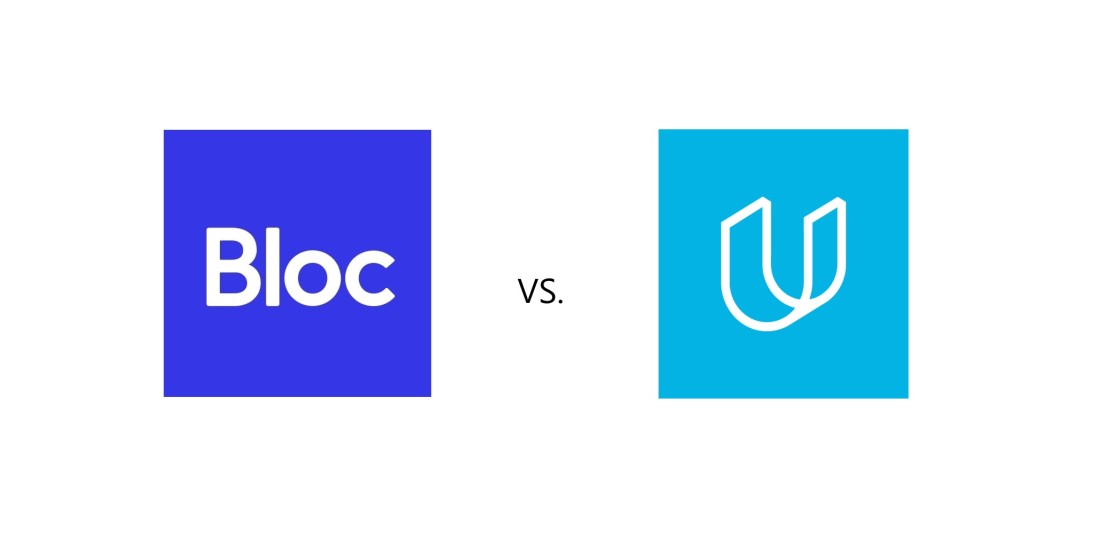My Experience: The Pros and Cons
If you’ve been following this blog or perhaps my Facebook, you may be aware that I chose to switch careers last November, from laboratory project management to full-stack web development. I love code and I love what I’m doing!
I started by completing Udacity’s Intro to Programming Nanodegree to get a basic understanding of code. I very much enjoyed it, but upon completion I felt I was still a long ways from my career as programmer. Though I liked Udacity, I was curious to see what other academies existed that offer similar services. This is when I began comparing side-by-side costs, and gathering reviews from verified graduates. My top two choices were Udacity (still) and Bloc.io. I eventually chose Bloc, but was almost simultaneously granted a Scholarship through Google to study font-end web development through Udacity.
Since I am now enrolled in both programs for over a month, I figured I would compare and contrast the two programs, their strengths, weaknesses and some other highlights of each for the benefit of anyone who might be considering a career switch. Even if you’re already working in software and curious about which will help you sharpen your skills, read on! If you are a staff member of either company, please note I am writing this as objectively as possible – I really have had a great experience with both programs.
Bloc’s Part-time Web Developer Program
Pros:
- Content is very forward-thinking, and focused on getting you to a professional career.
- Content is updated regularly to reflect industry standards. Also very important if you want to be employed in the field.
- Reliable job offer guarantee. Be sure to read the terms and conditions.
- 1 on 1 mentor-ship, weekly. This helps a lot if you are stuck, or want to know about what concepts you will need to use in the field, job interview questions, etc.
- Great support on Slack. Instructors actually visit the slack channels and provide feedback.
- Dedicated career services team
Cons:
- Price – 4 payments of $2125 or $7500 up front. By far the most expensive program out there. Ideally you get what you pay for, and landing a good job might negate this.
- Content can be out of order, confusing, or otherwise incorrect.
- I’ve been told this is because they update everything very frequently as the industry changes
- Examples: I have run into grammar/syntax errors, or tables containing the wrong section’s content.
- As a result of the previous point, you might need to do more independent studying to ensure you can pass the ‘checkpoints’ in the curriculum.
Highlights:
- Getting face-to-face career advice from those already employed in the field on a regular basis. I feel reassured knowing that I’m putting my time and money in the right direction and not down rabbit holes.
Udacity’s Front-End Nanodegree
Pros:
- Visual. Very visual. Lots of media, gifs, and instructional videos embedded throughout the course offering a virtual classroom feel. Very helpful for me as a visual leaner.
- Content is clear, concise, and written so a newbie can understand it easily. Sections are organized in a way that makes sense from a learner’s perspective.
- Price – $199/month Definitely the cheaper of the two programs, assuming you stay on track which is not difficult. I received a scholarship for the first 3 months so I am paying nothing at the moment.
Cons:
- Not much interaction from staff/instructors. A lot less than most people expect. You might have a ‘mentor’ but they likely wont respond immediately, mine actually never did. Ideally you are self-motivated anyways so this shouldn’t matter.
- There are instructors active on Slack, but they only check in from time to time for announcements or office hours. The slack community is great, but only worth as much as the effort you put into it.
- Less focused on getting a career in the field and more on education. Udacity used to have a job-offer guarantee on their Full-Stack Nanodegree, but have since removed this option.
Highlights:
- Udacity has been very easy for me to get lost in, in a positive way. Their content is engaging and can quickly suck you in, even if you’re totally new!

